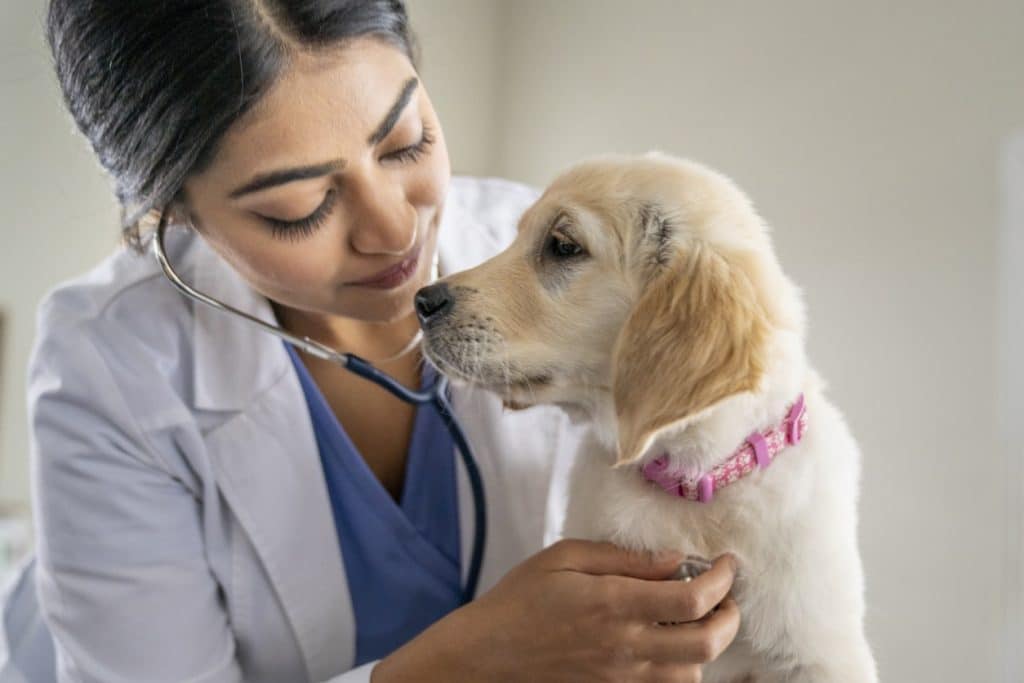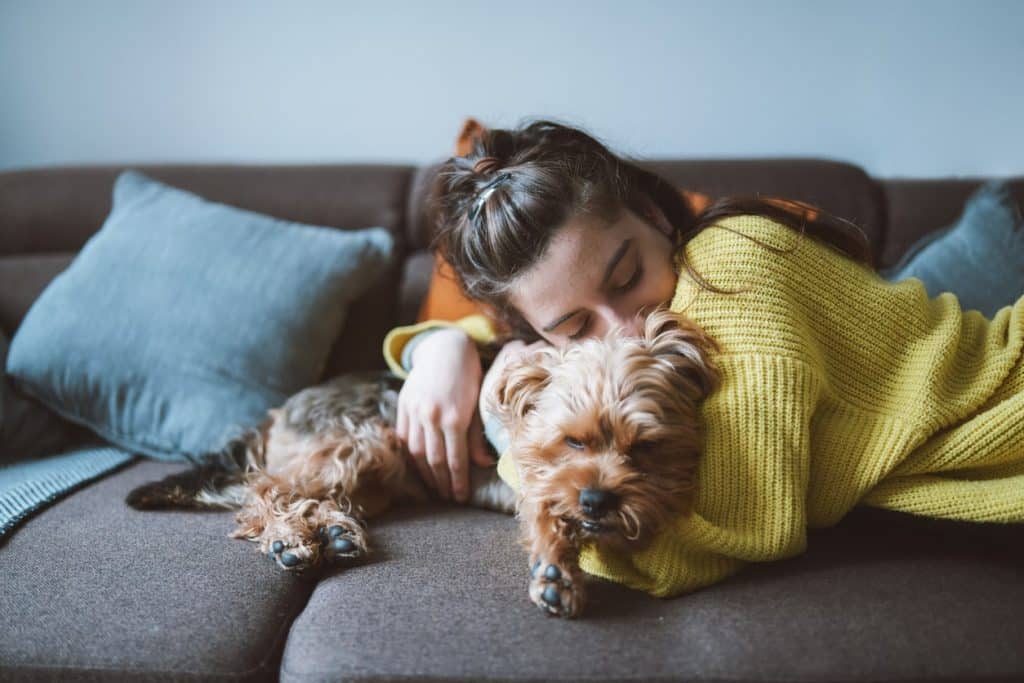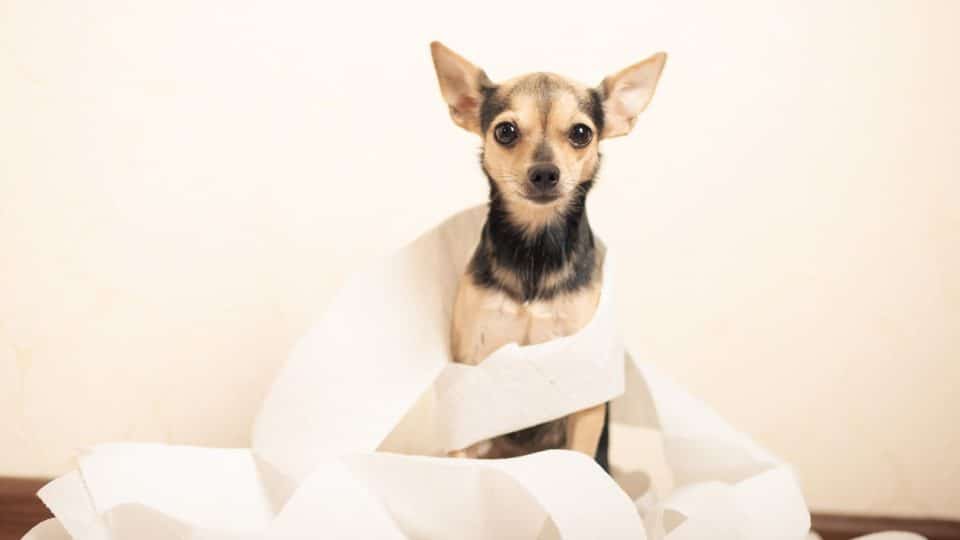Adding a puppy to your family is an incredibly joyful experience. However, it also comes with new responsibilities and care. Unpleasant things are part of the experience, from chewed-up shoes and incessant whining to nipping and tummy troubles like diarrhoea.
If your puppy is experiencing diarrhoea, keep a close eye on them. Puppies are still building their immune systems, so you want to be sure to treat any possible illness quickly. Below, we’ll discuss all things puppy diarrhoea, from the most common causes and when to see a vet to the best diarrhoea treatments and how to prevent it long-term.
Why Does My Puppy Have Diarrhoea?
There are many reasons why puppies could get diarrhoea. It could be an infection or a case of overfeeding. Your vet can help you diagnose and resolve any issues.
Here are the six most common causes of diarrhoea in puppies:
1. Diet change or food intolerance
Part of having a puppy means changing their food to keep up with their growing size or address a medical issue. If you switch your puppy’s food too rapidly, it can give them diarrhoea. Instead, make food transitions over 7 to 10 days unless otherwise instructed by your veterinarian. A more gradual transition gives the bacteria in your puppy’s gut time to adapt to the new food.
Additionally, your puppy might be intolerant or sensitive to certain foods. Consult with your vet to determine which hypoallergenic foods are best for your puppy.
2. Stress
Just like humans, dogs can feel stress and anxiety in their gut. Separation anxiety and acclimating to a new environment are the most common diarrhoea-inducing stressors for puppies.
To combat this stress, get puppies into a routine once you take them home to help them feel at ease.
3. Bacterial infection
“Puppies have immature immune systems that are not fully developed, which makes them more susceptible to bacterial, viral, or parasitic infections that can cause diarrhoea,” says Maria Baker, DVM, a veterinarian at pet-how.com.
While it’s normal for some bacteria to live in your puppy’s gut, sometimes “bad” bacteria sneak in and cause problems. The bacteria Salmonella, E. coli, and Campylobacter can all cause puppy diarrhoea.
Additionally, Dr. Baker says diarrhoea from bacterial infections tends to carry a foul smell. Pet parents may also notice mucus or blood in their stool.
4. Viral infection
Puppies are more susceptible to viruses than grown dogs because they haven’t received all their vaccines. Parvovirus, distemper, and coronavirus can all cause diarrhoea.
Dr. Baker explains that diarrhoea from viral infections is often watery. It can also cause symptoms like:
- Fever
- Lethargy (tiredness)
- Loss of appetite
- Vomiting
5. Parasites
Puppies can be born with parasites or catch them from the ground or water in their environment. These parasites live in a puppy’s gastrointestinal tract.
Your puppy can develop diarrhoea from:
- Giardia
- Coccidia
- Roundworms
- Whipworms
- Tapeworms
“Parasitic infections often result in diarrhoea with visible worms or other parasites in the stool,” says Dr. Baker. However, every infection is different, and you can’t always determine the source of diarrhoea just by looking at it.
6. Eating foreign objects, garbage, or toxins
Like babies, puppies love to explore the world through their mouths. They’re quick to ingest anything, including rotten food in the garbage, chocolate on the counter, and squeakers inside the toys they destroy.
As a puppy parent, know what foods are toxic for your puppy. Additionally, get rid of dangerous toys with small pieces that can block the intestines when ingested.
If you suspect your dog ate something toxic or has an intestinal blockage, take them to the emergency vet immediately.
What To Do If Your Puppy Has Diarrhoea?
First of all, don’t panic. You can handle this. After you clean up the diarrhoea, look to see whether there’s any blood or mucus.
Make sure to disinfect the area after cleaning up the diarrhoea. Once you’ve cleaned up the mess, make sure your puppy gets the aftercare they need. Patrick Mahaney VMD, CVA, CVJ, suggests the following:
- Keep your puppy hydrated with water or ice cubes to lick.
- Fast for 8, 12, or 24 hours while monitoring your puppy closely.
- Feed your puppy bland foods like white rice, boiled chicken, and vegetable broth to soothe their stomach
- Try fibre-rich foods like cooked sweet potato or pumpkin to get their stool back to normal.
- Give them probiotics to replenish their gut health. Probiotics come in various forms, such as powders, capsules, chews, and yoghurt or kefir.
- Incorporate prebiotic foods to nourish and promote the growth of good bacteria living in the colon.
- Ask your veterinarian about Rx Clay, which calms down and detoxifies the gastrointestinal tract.
You may also want to place the stool inside a plastic baggie to give to your veterinarian as a faecal sample. The fresher, the better. If you’re not going to the vet right away, you can store the sample in your refrigerator for a few hours. Double-bag it to ensure it doesn’t contaminate your refrigerator or food.

iStock/FatCamera
When To See a Vet About Your Puppy’s Diarrhoea?
Monitor your puppy closely after they have diarrhoea. If diarrhoea only happens once within 24 hours, and they act normal, all is likely well. Dr. Nicole Savageau, a veterinarian at The Vets, says you should reach out to your veterinarian if your puppy:
- Has persistent or worsening diarrhoea
- Has blood in their stool
- Acts lethargic or mopey
- Starts vomiting
- Stops eating and drinking
Dr. Baker says vets might recommend over-the-counter medications to treat diarrhoea. If an infection is causing the diarrhoea, the medication will be tailored to the specific illness. Antibiotics treat bacterial infections, antivirals treat viral infections, and antiparasitics treat parasitic infections.
Your vet can tell you the safest dose for your puppy’s size and age.
Why Is Puppy Diarrhoea Concerning?
Puppy diarrhoea can be a more serious issue than diarrhoea in adults or seniors. “Their small size means they have less body fluid reserves to begin with, so any loss of fluids through diarrhoea can quickly lead to dehydration,” Dr. Baker explains. Severe dehydration can be deadly for growing puppies.
Additionally, chronic diarrhoea could have long-term effects. Dr. Baker says diarrhoea interferes with a puppy’s ability to absorb the proper nutrients from food; this deficiency can hinder their growth and development.
Some risk factors for severe diarrhoea include:
- Age: Puppies under six months have a higher risk of diarrhoea.
- Breed: Dr. Baker says Irish Setters, Scottish Terriers, and Yorkshire Terriers are prone to digestive issues like diarrhoea.
- Environment: Puppies at high-volume breeders are more likely to get infections that cause severe diarrhoea.

iStock/ArtistGNDphotography
How To Prevent Puppy Diarrhoea
While you can’t prevent every case of tummy troubles, you can use these strategies to lower your pup’s risk of diarrhoea:
- Puppy-proof your house so they can’t snack on trash or human food
- Be careful feeding your puppy cow’s milk or dairy products, as many dogs are lactose-intolerant
- Avoid feeding too many treats or fatty foods, like liver or table scraps
- Don’t leave your puppy alone for too long, or else you may come back to find stress diarrhoea
- Keep exercise to an age-appropriate level as too much excitement can also cause stress diarrhoea
- Vaccinate your puppy as they get old enough for each shot



